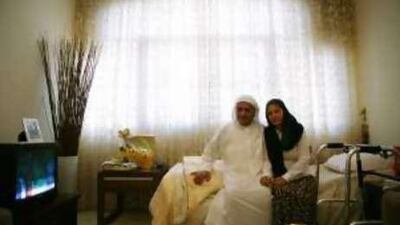ABU DHABI // Roya Hassan's fate will be sealed on Nov 4. The first woman to graduate in law from Al Ain's United Arab Emirates University in 1982, she says she has never been able to practise because she is a "bidoon", one of an estimated 10,000 stateless people living in the UAE without passports or other legal documentation. A week on Tuesday she will be interviewed by officials from the Government's Citizenship Committee, who will decide whether she can become an Emirati citizen.
Her father moved to Ras al Khaimah from Tabriz, in northwestern Iran, in 1953. Fresh out of military service with the equivalent of Dh650 in savings, considered "good money for that time", Hassan Ibrahim Hassan came in search of adventure. "It was not difficult for them in Tabriz," says Mrs Hassan. "They just wanted a challenge. A few of the boys wanted to leave the place and they had friends here who encouraged them to come."
In Ras al Khaimah, "there were no shops, no houses, no food", she says, "and at first, there was no work. They had a little jar that they used to collect any money they could gather from odd jobs that would come to them. But the people here were so kind. They took care of them. The hospitality was so good. They were always opening their homes and sharing their food." Mr Hassan met a carpenter in RAK and entered into an apprenticeship. After six years he moved to Khor Fakkan, in Sharjah, where he opened his own carpentry shop and went on to raise four children with his wife, a fellow Iranian he had met in RAK.
"He was the most famous carpenter in the whole area," says Mrs Hassan. "Everyone knew him, everyone was constantly inviting him over for a coffee, a tea, a meal." Mr Hassan, who at 78 works as a watchman at a centre for handicapped children in Kalba, was given a Sharjah passport in 1971, but when the UAE was formed at the end of that year, he was instead reissued with a temporary UAE passport, which he had to renew every six months.
The rules changed in 1982 - the year his daughter graduated. Since then, Mr Hassan has not been able to get a passport for himself, his wife or his children, as they are not in possession of the required UAE national birth registration certificate. "We were Emirati citizens until 1982," says his daughter. "We were able to travel. "Do I belong here? I was born here. I studied here, I grew up here, I made all my friends here, I went to their homes and they came to mine, they were like my sisters. I used to jump from house to house and wall to wall to get to their homes and I was known as the monkey of the neighbourhood. "Of course I belong here, this is my home."
After graduating from law ahead of the other female students who started with her, Mrs Hassan fought hard for the right to practise her chosen subject. "I tried to work in law?many of my friends in Fujairah tried to help me and pull some strings, but it didn't work. Instead, I worked in the legal departments of a lot of different companies, but it wasn't the same. I wanted to be a lawyer. I wanted to be in court."
It was not to be. "Imagine studying and working so hard for something, even struggling to be allowed to go to law school, and dreaming of it, then you simply can't do the job you have studied for," she says. Mrs Hassan's younger sister managed to get papers from the Iranian embassy, which in 1989 enabled her to leave for Canada, where she works as a journalist. "She did not have the patience to wait," says Mrs Hassan. "Although we are very comfortable here, we are still facing so many problems due to a lack of official papers and a passport. We can't travel, we can't easily change our jobs, we have difficulties registering a car, or buying property, or opening a bank account, even. Nothing comes easy for us."
Mrs Hassan, 46, frustrated with working in legal departments, had a stint in newspapers and radio, before joining Abu Dhabi Aircraft Technologies, a part of the Mubadala Development Company, where she has been working for the past 20 years. "The most important thing in my life right now is to get this passport," she says. It would enable her to travel if she needed medical treatment overseas, or to visit her two sons - one of whom is Bayan, the guitarist in the Abu Dhabi-based rock group Juliana Down - if they chose to live abroad.
Most importantly, she could finally fulfil her lifelong ambition. "I am definitely planning to continue my studies," she says. "I want to get my master's and PhD degrees, that's what I'm hoping for. "Then depending on what opportunities come up, I will either practise law or teach law in the university. This is the dream I am living for." kattwood@thenational.ae hkalaf@thenational.ae

